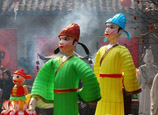
 |
| Guatai Mountain in Tianshui is said to be the birthplace of Fu Xi, the forefather of early Chinese civilization. (China Daily/ Li Yongsheng) |
A trip to Northwest China offers fresh air and a connection to the roots of Chinese philosophy, Li Yang reports from Tianshui, Gansu province.
My three-day trip to Tianshui in Gansu province is a refreshing getaway from Beijing's lingering smoggy air — not only for my lungs but also my mind. With its crystal-clear blue sky and fresh clean air, this remote city seems to me more suitable for living than the country's capital.
Many places in Gansu are named for their military purposes in history, as for centuries the area bordered frontier territories.
But Tianshui, which means "sky water", is an exception.
Located in the southeast end of Gansu, Tianshui has prospered for about 2,700 years as an agricultural center nestled in the fertile valley of the Weihe River, the largest branch of the Yellow River.
More importantly, it is one of the cradles of the country's civilization.
Also known as Longcheng, or Dragon City, Tianshui is the hometown of Fu Xi, one of the earliest and most important rulers in Chinese lore. Unearthed relics in Tianshui show that Fu Xi was a real-life tribal leader living about 7,800 years ago.
There is a big temple for Fu Xi built during the Ming Dynasty (1368-1644) in the city center. Guatai Mountain, where he was born and worked, is now a tourist attraction located near the Weihe River in the north of the city.
The temple is worthy of a visit. The main hall and the statue of Fu Xi were built more than 500 years ago. Local people tell me the temple was used as barracks in the "cultural revolution" (1966-76) and therefore was not destroyed by the Red Guards.
Most ancient temples or monasteries in China feature Buddhist and Taoist gods as well as legendary figures in folktales. But Fu Xi Temple has only his own statue, because his period was much earlier than the other religions.
Fu Xi is revered for his achievements and wisdom. During the time of his rule, the society was matriarchal and primitive.
Fu Xi cut hides of the sika deer into handkerchief-size pieces, and then divided each piece into two — one half for a man and the other half for his bride as the proof of their marriage, because the stripes on each piece of hide were unique. By doing so, he brought order to his society.
He recorded events by knotting ropes and taught his people to collect seeds, cultivate and irrigate land and plant grains. He knew how to hunt wild animals but also taught his people to domesticate animals for hides and food.
There was clear labor division in his tribe. Some people were assigned to do farm work, some to hunt and make clothes from leaves and furs. Some were fighters, to safeguard the women and children from hostile tribes.
To some extent, he was the forefather of early Chinese civilization, as many of his pioneering practices were spread to other parts of China along as he expanded his territory.
Many of his creations helped to form a stable family, society, government and State later in the history of China.
The most popular totem for his tribe was the snake, and Fu Xi was often portrayed as a noble creature with a human head and a snake's body.
The Chinese character long, or dragon, which dates back to the early history of Chinese language, also refers to the snake. People sometimes refer to snakes as xiao long, or little dragons.
It is said that Fu Xi once saw a holy horse covered by scales with one wing on each side of its back coming out of the Weihe River. Then his people replaced the human head of his totem with a horse head, which was later adapted to a head of the mythical kylin. Like this prototype, the dragon would later swim in the water and fly in the sky, in legend.
Fu Xi also invented bagua or Eight Trigrams, which formed the basis of Chinese traditional philosophies like Taoism and Confucianism.
The Eight Trigrams represent the fundamental principles of reality, seen as a range of eight interrelated concepts, embodied by sky and earth, fire and water, mountain and lake, wind and thunder.
Legend says that Fu Xi often stood on Guatai Mountain, which was encircled by the Weihe River, pondering the flowing water, the mountain, the land and sky.
Fu Xi put his theory of yin-and-yang balance into practice in his governance and leadership. He told people to be generous, forgiving and humble.
Because he improved people's lives, his dragon totem has become an auspicious symbol in Chinese culture. All of Fu Xi's wisdom, majesty and power are fused together as the character of the dragon, representing peace, not violence.
Guatai Mountain and the Weihe River are still here, as they were about 7,800 years ago.
Standing on the exact spot where Fu Xi got his inspiration, I keenly feel a connection across time and space with this ancestor, through the soil under my feet and the sunshine embracing me. I am an offspring of the dragon.
To understand this nation, the hometown of Fu Xi is well worth a visit.

















 China uses PM 2.5 in weather alert system
China uses PM 2.5 in weather alert system


![]()
